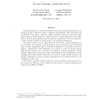Free Online Productivity Tools
i2Speak
i2Symbol
i2OCR
iTex2Img
iWeb2Print
iWeb2Shot
i2Type
iPdf2Split
iPdf2Merge
i2Bopomofo
i2Arabic
i2Style
i2Image
i2PDF
iLatex2Rtf
Sci2ools
103
click to vote
SCN
2010
Springer
2010
Springer
Group Message Authentication
Group signatures is a powerful primitive with many practical applications, allowing a group of parties to share a signature functionality, while protecting the anonymity of the signer. However, despite intensive research in the past years, there is still no fully satisfactory implementation of group signatures in the plain model. The schemes proposed so far are either too inefficient to be used in practice, or their security is based on rather strong, non-standard assumptions. We observe that for some applications the full power of group signatures is not necessary. For example, a group signature can be verified by any third party, while in many applications such a universal verifiability is not needed or even not desired. Motivated by this observation, we propose a notion of group message authentication, which can be viewed as a relaxation of group signatures. Group message authentication enjoys the group-oriented features of group signatures, while dropping some of the features wh...
Related Content
| Added | 30 Jan 2011 |
| Updated | 30 Jan 2011 |
| Type | Journal |
| Year | 2010 |
| Where | SCN |
| Authors | Bartosz Przydatek, Douglas Wikström |
Comments (0)

